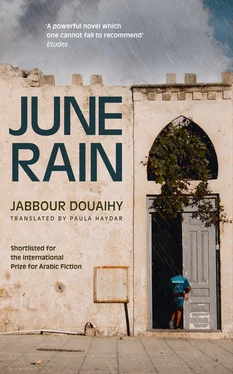She looked at me inquisitively. I felt she was hesitating a little. Then she looked into my eyes and said in the kind of tone a person uses when putting up with other people’s stupidity, ‘My darling, my soul, my eyes… Muntaha… I told you all, I’m not pregnant.’
‘And what if you are pregnant, then what?’
She almost started laughing.
The time to lift the body drew near. The women emptied out what wailing they still had left in them. That strange woman passed by us. No one knew where she had come from, how she got to us, or where she went after completing her mission.
I saw a woman I’d never seen in our quarter before. She was tall and fair-skinned. She moved from one bed to another, sat down next to the dead, fixing their ties, brushing the stray hair from their foreheads or wiping off some blood or dirt. She would look at each face a little and then move on to the next.
Kamileh threw herself onto her husband and lost consciousness for the second time. We had to carry her into the church.
We used to enjoy getting mad at each other. It was how we tested the warmth of our friendships and the true meaning of those family ties we were always boasting about. At the slightest derisive remark some tattletale whispered to us about one of our buddies we instantly responded with anger, and the next day we would turn our faces away from him and refrain from saluting him if we chanced upon him in the streets. Those were the challenges of early manhood; our insistence on ignoring each other did not last long in the light of the unspoken agreement that there should be no disputes between cousins, and we were all related after all, as some of the ‘peacemakers’ loved to repeat. In reality, we got fed up with each other from time to time, got bored hanging around with each other for hours on end in the squares and alleys as we tried to stay away from our cramped houses, especially when our mothers were busy cleaning and mopping and had kicked us out. We never let an opportunity to argue and get angry at each other slip by, plunging into it headlong for the most trivial excuse.
That is until we heard about al-muqaata’a al-hayaatiyyah , being ‘shunned for life’. This phrase came to us just like that, ready-made, a concept in itself. It was pronounced plainly and emphatically. And what it meant was, if one of the members of the Syrian Socialist Nationalist Party disobeyed the party orders or deviated from what was deemed proper and virtuous behaviour, then the other members would not talk to him until the day he died. That also applied to his brothers if he had any. The party members obeyed all the instructions of their leadership, which was composed of an amid (chief), a namous (secretary), and a qayyim ala al-idhaa’a (spokesperson) and other positions with equally strange names.
I remember how the possibility of that kind of antagonism was particularly worrying to us because of its finality, but it also made the party more attractive to us, especially because of the pleasure those adherents to its strict doctrine took in recounting their stories in front of us. They told us how they had assassinated King Abdullah of Jordan for betraying the Palestinian cause, and about their retaliation for the execution of the party’s founder Antoun Saadeh under the cover of darkness, which was to assassinate Lebanese Prime Minister Riad al-Sulh. It had been carried out by a man from the Al-Deek family who said to the prime minister before shooting him, ‘Take this, a gift from al-Zaeem .’ The party members, young and old alike, always insisted on using the first person plural, saying things like, ‘When we killed Adnan al-Malki in Syria…’ In that way they transformed the assassinations into collective acts of heroism which even those who weren’t yet born at the time could boast about.
They taught us how to draw their hurricane emblem on the walls using pieces of charcoal or chalk, and they would interrupt this lesson whenever they spotted one of their comrades passing through the neighbourhood. They would raise their right arm and thrust it forward, open-handed in a military salute while barking out the phrase ‘Long live Syria!’, to which the comrade passing by responded in kind. They were always repeating pretentious words and phrases for our benefit, such as ‘You Are the Sons of Life’ or ‘Integrity’ and expressions like ‘Truth, Goodness, and Beauty’. We used to marvel at how our friends in the quarter reacted to hearing such expressions with eyes brimming with admiration for their meanings. We, on the other hand, had difficulty appreciating them because they reminded us of phrases out of our catechism books or the tiresome and incomprehensible epistles of Saint Paul.
When the Rami family joined ranks with Nasser’s Revolution and the United Arab Republic, and when the Semaani family supported President Camille Chamoun’s alliance with the Americans, the supporters of the Fertile Crescent — their ultimate objective, with Cyprus as its star — got lost in the shuffle. Our friends in the quarter, the few that we had, couldn’t decide which way to go and so the ‘weaklings’ among them yielded to their families; one could say that those whose family’s position was in agreement with their party’s position were the lucky ones. But it so happened that two or three members of the Rami family stubbornly broke away from their family, and one of them, people say, one and only one of them, took up arms with the anti-revolutionary forces, but at a front a long distance from the village.
The communists were further from our own instincts for vengeance and spite, which might explain why they remained a small minority of mature and polite adherents. They, too, had their obscure expressions which they spouted off after reading pamphlets by Stalin that had been hurriedly translated into Arabic and handed out to them for free, and which spoke about dialectics and materialism. Their emblem was less geometrical and more realistic than that of the Syrian Socialists, even though we rarely saw a sickle due to the scarcity of wheat in our region. And we never encountered a hammer of that size, except for the one the only blacksmith in town used to strike iron when it was red hot. One of their few accomplishments was their effort to raise a petition against the nuclear bomb, and one of the things they bequeathed to us was the name ‘Vladimir’, the first name of the leader of the October Revolution, which one of those internationalists gave to his son. Vladimir, at least, was less of a burden than Adolf, the first name of the leader of the Third Reich, which was given by one of the few adherents of Nazism to his oldest son, and is equally as strange as Daladier, the prime minister of France who signed the Munich Accord.
The new car, straight from the dealership. We knew it by the smell of its leather seats. It had to be driven carefully through the narrow, winding roads of the quarter and pulled right up to the Church of Our Lady, kissing the bumper against the wall. There it was under the protection of the Virgin Mary, and a turquoise amulet hung from the rearview mirror, the horse’s bead itself or the horseshoe, it didn’t matter which one.
At the start of the 1950s, the car was added to the list of possessions a man simply did not lend out, like his wife or his rifle, and there was mechanical justification for a man insisting on being the sole driver of his car, since changing hands would increase the risk of it breaking down. Weapons were decorations, signs of manhood, but an American car — a Chevrolet or a DeSoto — decked out with what looked like two bird wings, and especially if it was a convertible with only two doors, had a fine wood inlay dash, a shiny chrome grill and coloured seats, well that topped the list of alluring essentials and sometimes topped a groom’s list of necessary possessions right along with a house to live in and a trade, as they put it, referring to the various common occupations such as carpentry or tailoring. And the owner of a new car never refused a photographer’s offer to take a picture of him behind the steering wheel or standing beside it with his hand on the door, by himself or surrounded by friends who would be certain to let him stand front and centre making it clear who the owner of the shiny new DeSoto was.
Читать дальше












